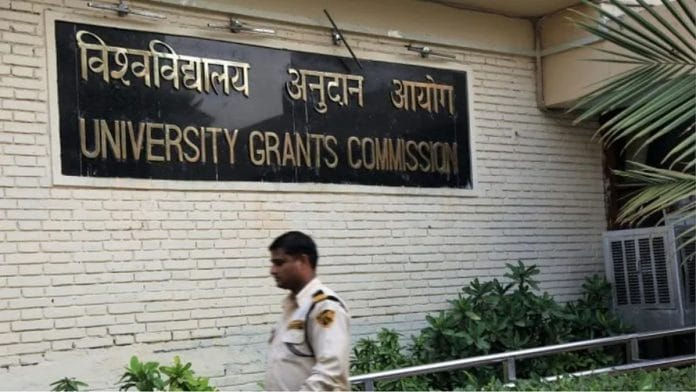New Delhi: Civil servants, engineers, mediapersons, armed forces officers, lawyers, and artists with 15 years of experience will now be able to teach in colleges and universities without a PhD, the University Grants Commission (UGC) said in its latest guidelines.
In its guidelines on ‘Professors of Practice’ accessed by ThePrint, the UGC also said that such candidates were exempted from the condition of publishing a research paper — a mandate for regular faculty recruitment in higher education.
The UGC approved the scheme in its meeting held last week, its chairman M. Jagadesh Kumar told ThePrint. The guidelines will soon be released publicly, he informed.
In March, the UGC chairman had told ThePrint that the idea to recruit industry experts was discussed with vice-chancellors of various universities.
“Those who have proven expertise in their specific profession, or role with at least 15 years of service/experience, preferably at a senior level, will be eligible for Professor of Practice,” the guidelines issued Monday said.
This category of professors can be from fields such as engineering, science, technology, entrepreneurship, commerce, social sciences, media, literature, fine arts, civil services, armed forces, law, and public administration, among others.
Only 10 per cent of an educational institution’s total faculty can be ‘Professors of Practice’ at any given point, the guidelines say.
The scheme has divided educationists, with a section saying that universities and institutions must proceed with caution when it comes to implementing the scheme.
Former Delhi University vice-chancellor Dinesh Singh said although it was a good idea “in principle”, institutions will need to get “creative” for implementation.
“In principle, this is a welcome idea because our universities need to move away in a significant way from the confines of the blackboard and books. In other words, our knowledge systems must be connected to the needs and challenges of the real world. However, this is not happening in a meaningful way in any university. The NEP (National Education Policy) is shouting from the rooftop for this to happen,” he said.
Also Read: UGC wants universities to offer up to 40% of courses online. Professors don’t see the point
What the policy says
Under the new UGC guidelines, vice-chancellors or directors of an educational institution can nominate experts to such positions.
“The experts willing to serve may also be nominated or they can send their nomination to the Vice-Chancellor/Director with a detailed biodata and a brief write-up about their potential contribution to the institute,” the guidelines said.
A selection committee consisting of two senior professors from the institute and one eminent external member will consider the nominations. Based on the committee’s recommendation, the institution’s Academic Council and the Executive Council or its statutory academic bodies will decide on whom to engage.
Such ‘Professors of Practice’ will not only impart lectures but will also design their own curriculum as well as work on “active collaboration” in the industry for various aspects, such as project work or getting internships.
The term of such faculty members “may be initially for up to one year” and can later be extended for up to four years but not beyond that.
“At the end of the initial engagement or subsequent extension, the institute will make an assessment and take the decision about extension,” the guidelines said. “It will devise its own assessment procedure for extension based on the contribution and requirement of the experts engaged as Professors of Practice.”
“The maximum duration of service of Professor of Practice at a given institution should not exceed three years and is extendable by one year in exceptional cases and the total service should not exceed four years under any circumstances,” the guidelines said.
‘Nothing new’ to ‘antagonising teachers’: What educationists think
A professor at the Jawaharlal Nehru University said that hiring people for short-term roles — such as adjunct faculty positions — isn’t new to universities in the country. “I don’t see what’s new with this scheme unless we get some exemplary talent like people from NASA coming and teaching at our institutions,” the professor said.
Some, however, feared the fallout of such a policy. Subodh Kumar, a professor of political science at Delhi University, said the policy will “dilute the quality of higher education”.
“This idea will only antagonise the existing teaching community. Teaching isn’t just about imparting textbook knowledge, it is much more than that. (It’s) something that only a teacher understands; not an engineer or a civil servant,” he said.
It will also have an effect on the reservation policy, “because the 10 per cent who will be hired will be (through) direct recruitment”, Kumar said.
But, it appears that the government has taken care to not disturb the quota of reservations. “The engagement of Professor of Practice will be exclusive of the sanctioned posts of a university/college. It will not affect the number of sanctioned posts and the recruitment of regular faculty members,” the UGC guidelines read.
(Edited by Uttara Ramaswamy)
Also Read: NEP has lofty goals to promote research culture. UGC undermining its basic tool—publishing






